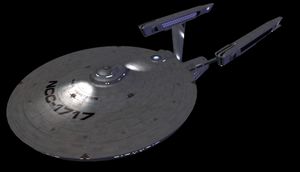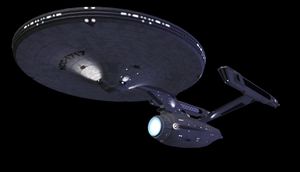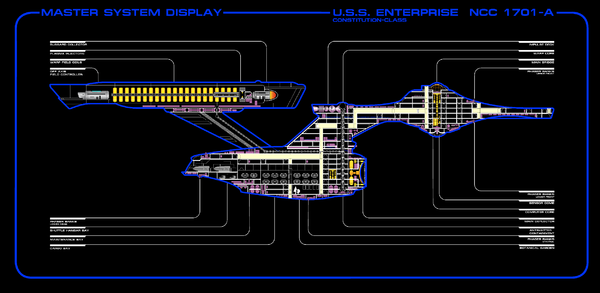Stats given are that of the upgraded Constitution Refit Class used by Solas Tempus after redesign and refit. For general refits to meet Solas Tempus specifications see Refit Guidelines and for original stats please see Memory Alpha. |


After long service of the original Constitution Class Starfleet command decided to refit the design to modern guidelines in the latter half of the 23rd century. This was done during the construction of the experimental Excelsior Class. The vessel design is so well engineered, being a refit of the then-Flagship the USS Enterprise, that it is still in service today in parts of Federation Space, though in a diminished capacity.
Many of the systems upgrades were contracted out to the engineering arm of Solas Tempus. In conjunction with Starfleet Command the team also worked up experimental refit guidelines for a vessel to be in service of Solas Tempus. Since the parties did not come to terms on a direct exchange of vessels, many of the existing vessels have been in service for a very long time, Solas Tempus began construction on a new prototype Solas Tempus model in 2377.
- Dimensions
- 305 x 71 x 142 meters
- Crew
- 72 Officers
428 Crew - Deck Plans
- File:Constitution Refit Deck Plans.pdf
- Cruising Speed
- Warp 6 / Fold 5
- Max Speed
- Warp 9.56 / Fold 8.2
- Emergency Speed
- Warp 9.85 / Fold 9.5 for 12 Hours
- Power
- Matter/Antimatter Reactor
Fusion Reactor
Cold Fusion Battery Cells (25) - Propulsion
- Gravitational Displacement Drive
Dimensional Fold Drive
Warp Drive
Impulse Drive
Offensive Systems
- 12 Phaser Banks (18 emitters)
- 2 Photon Torpedo Tubes (20 Torpedoes)
- Deflector Beam Weapon
Defensive Systems
- Deflector Shields
- Phasing Cloak
- Energy Signature Modification System
- Holographic Hull Markings
Auxiliary Systems
The refit design allows for the use of isiolinear & bioneural circuitry in addition to redesigned and modern SIF and IDF systems.
Auxiliary Craft
Upgrades and Rebuilds
Experimental results revealed that the space-frame could be remanufactured with only slight modifications to support extensive propulsion and systems refits beyond the Starfleet standard. Power systems were entirely rebuilt from the ground up incorporating new technologies. As were the computer cores, shield systems, weapons systems, and sensor suites. Two additional drive systems were added, an experimental Gravitational Displacement Drive as well as the Dimensional Fold Drive. The GDD has previously been unavailable on vessels this large, however, new breakthroughs in the design of the drive system and the produced gravitational envelope have been showed to be successful when using the main deflector to assist stabilizing the gravitational flux. It is, however, as yet largely untested.
Master Systems Display
